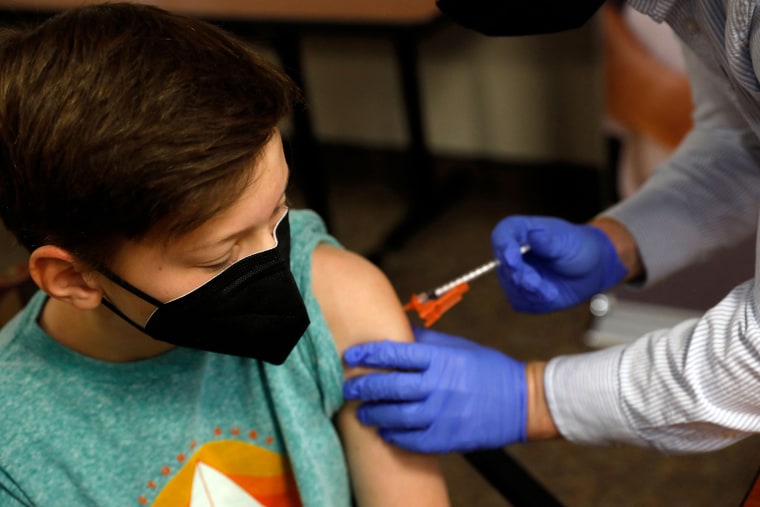A booster dose of the Pfizer-BioNTech Covid-19 vaccine raised antibody levels in children ages 5 to 11, the company said Thursday.
The additional shot, given six months after the two-dose primary series, led to a sixfold increase in antibodies against the original strain of the coronavirus.
Full coverage of the Covid-19 pandemic
The clinical trial of the booster shot included 140 children ages 5 through 11. In a smaller sub-analysis of 30 kids in the trial, Pfizer said the additional dose led to a thirtysixfold increase in antibodies against the omicron variant of the virus.
Pfizer announced the trial results in a news release. The data have not yet been made available to outside scientists for review.
The results are welcome news, but as scientists have seen in the omicron era, the booster may only provide short-lived protection against infection.
Antibodies generated from a booster dose of the Pfizer vaccine in adults wane after about four months, and the same phenomenon could occur in kids, said Dr. Isaac Bogoch, an infectious disease specialist at the University of Toronto.
Protection against infection is the ideal, but "it doesn't appear that we're going to have a very effective campaign in doing so based on everything we know about how these vaccines work," Bogoch said. Still, the vaccines offer protection against more severe outcomes, such as hospitalization and death.
Pfizer's Covid vaccine for kids 5-11 comes in a smaller dose than its vaccine for people ages 12 and up: 10 micrograms, compared to 30 micrograms. The booster shot is also 10 micrograms.
In February, researchers from New York State Department of Health reported that two doses of the Pfizer vaccine offered little protection against infection in children in this age group, with the vaccine's effectiveness falling to 12 percent in December and January.
The Centers for Disease Control and Prevention later reported that the two doses for children still protected strongly against severe outcomes of Covid, including hospitalization and death.
In that report, CDC researchers said the omicron variant was the reason the shots' protection fell so low. The omicron wave led to a record number of cases in children, compared to earlier waves.
Less than 30 percent of children ages 5 to 11 have received two doses of a vaccine, according to new data from the CDC.
Pfizer said it plans to submit its data to the Food and Drug Administration in the coming days for emergency use authorization. Currently, Pfizer boosters are available only to people ages 12 and up.
Bogoch said overall there should be a “high bar” for authorizing the booster, considering two doses of the Pfizer vaccine in kids ages 5 to 11 still appear to be doing a good job of protecting against severe illness and death.
Dr. Paul Offit, a vaccine expert at Children’s Hospital of Philadelphia, agreed, saying the goal of the vaccine should be to prevent hospitalization and death.
"We are going to have to accept mild disease as part of this virus," he said.
It's unclear whether the FDA will consider authorization for the entire age group or only for certain kids, like those with underlying medical conditions that put them at high risk for severe illness from Covid, Bogoch noted.
Regulators will also have to balance the potential benefits of a third dose with the potential for rare but serious side effects, such as myocarditis, he said.
The mRNA Covid vaccines, from both Pfizer and Moderna, have been linked to a small but increased risk of the condition, mainly in young men. However, the CDC reported earlier this month that the risk of myocarditis is higher from Covid than it is from vaccination.
Follow NBC HEALTH on Twitter & Facebook.


